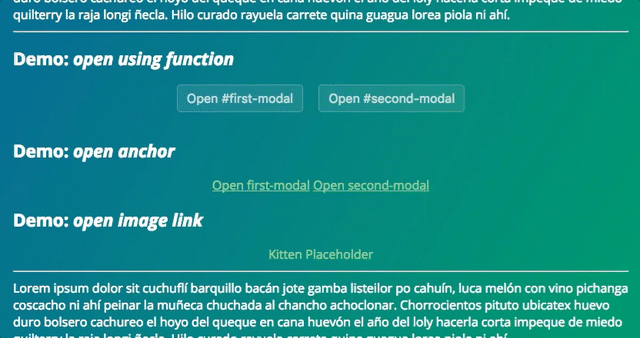tinymodal-npm
v1.0.2
Published
tinyModal.js ===
Readme
tinyModal.js
Clean, Fast, Modular and customizable Modal Window controller
What? Another one?
But this one is really flexible. And only 2kb (min). And semantic-oriented (content must be in the document).

Features
- Super fast ✔
- Super lightweight ✔✔✔
- JS only 2kb (.min) ✔
- CSS only 0.8kb (.min) ✔
- IE8+ ✔
- Total control of design and transition effects ✔✔
- No need or jQuery or other library (Vanilla JS) ✔✔✔
- Open Source 🌟
Still not convinced? Check out this ↓ complete ↓ comparison ↓ table ↓
| | tinyModal | Lightbox | Fancybox 2 | Bootstrap's Modal.js | |--------------|------------|----------|------------|----------------------| | Size | 2kb ✔ | 8kb | 23kb | 8kb | | Dependency | just some CSS ✔ | jQuery (+88kb) | jQuery (+88kb) | jQuery (+88kb) + Bootstrap.js (30kb) | | Performance | smooth ✔ | heavy repaint | heavy repaint | good | | Design | your CSS ✔ | own | own | own | | Effects | your CSS3 ✔ | own | own | own | | Responsive | sure ✔ | nope | nope | yes | | Mobile-friendly | yep ✔ | nope | nope | nope | | Conflict | none ✔ | probably | probably | probably | | Target | coders ✔ | newbies | newbies | newbies |
Demos
Use
Add
tinyModal.cssandtinyModal.jsto your pages/templates.Create as many modal windows as needed using the following markup and the
tinymodal-windowclass:
<aside id="first-modal" class="tinymodal-window">
<div class="tinymodal-inner">
...
<button class="tinymodal-close">X</button>
</div>
</aside>- Then call the modal using a link and
tinymodal-modalclass:
<a href="#first-modal" class="tinymodal-modal">Open first-modal</a>- Apply the event handler to all links (or other selector):
var links = document.querySelectorAll('a.tinymodal-modal');
for (var i = 0; links.length > i; i++) {
links[i].addEventListener("click", function(event){ // callback
event.preventDefault();
var element = this.getAttribute("href");
tinyModal.openModal(element, function(){
var closeLink = this.querySelectorAll('a[href="javascript:closeModal()"]');
if (closeLink.length < 1) {
var closeLink = document.createElement("a");
closeLink.setAttribute("href","javascript:closeModal()");
closeLink.innerHTML = "X";
this.appendChild(closeLink);
}
});
});
}- If needed, you can open modal windows using JavaScript and the onClick event:
<button onclick="javascript:openModal();">Open #first-modal with JS</button>
<button onclick="javascript:closeModal();">Close with JS</button>function openModal() {
tinyModal.openModal("#first-modal", function(){
// callback
console.log('#first-modal opened');
});
}
function closeModal() {
tinyModal.closeModal(function(){
// callback
console.log('closed by closeModal() function');
});
}Design
Base modal styles are included in tinyModal.scss but you should add your own styles. Base CSS clases for design are:
.tinymodal-cover {}
.tinymodal-window {}
.tinymodal-active {}
.tinymodal-close {}And the functional CSS clases are:
.tinymodal-ready {}
.tinymodal-active {}
.tinymodal-window-open {}
.tinymodal-ready {}Developing
Need to change anything?
$ git clone https://github.com/juanbrujo/tinyModal.git
$ npm install
$ grunt // build
$ grunt watch // develop
$ grunt testjs // jshint test